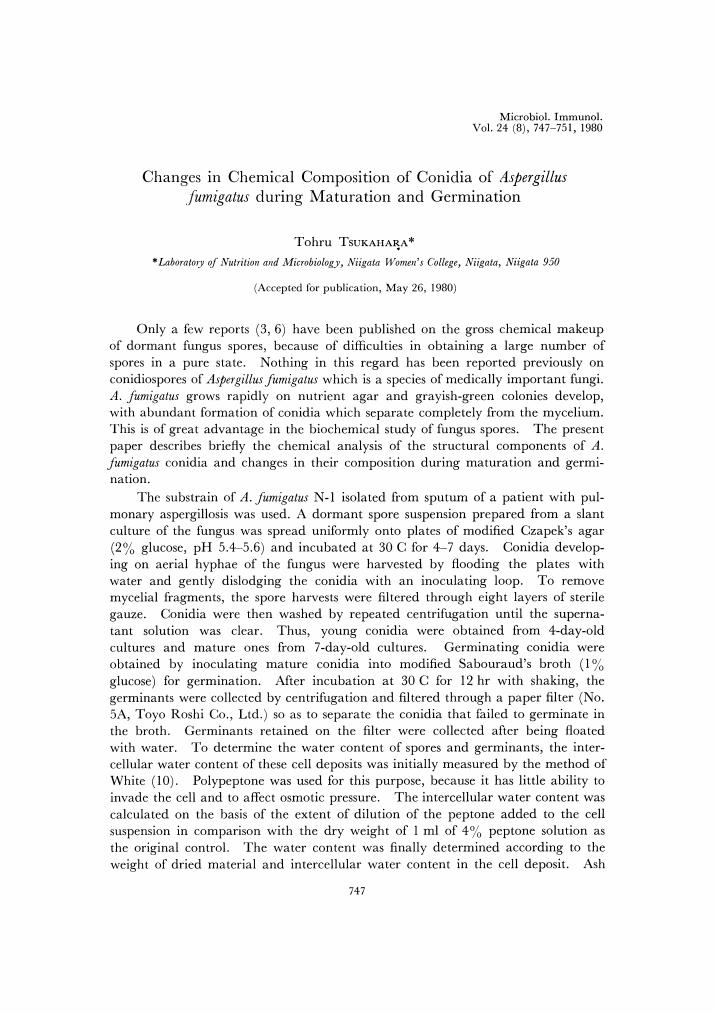- 著者
- Shoichi NAKASHIMA Yukio UMEDA Taira KANADA
- 出版者
- Center For Academic Publications Japan
- 雑誌
- MICROBIOLOGY and IMMUNOLOGY (ISSN:03855600)
- 巻号頁・発行日
- vol.23, no.6, pp.501-513, 1979-06-20 (Released:2009-10-15)
- 参考文献数
- 25
Prior intraperitoneal (i.p.) or oral administration of the polysaccharide preparation from a kind of mushroom, Ganoderma applanatum (Pers.) Pat. of Basidiomycetes, exerted an enhancing effect on the induction of delayed hypersensitivity (DH) to protein antigen as measured by the footpad reaction (FPR), and expanded the size of T cell memory for the IgG antibody response. One of the active principles was partially purified and found to be associated with a polysaccharide-rich fraction. The induction of DH was enhanced by treatment with an appropriate dose of the mushroom extract, whereas increasing the dose resulted in almost complete loss of the enhancing activity.The mechanism for the enhancing effect of the mushroom extract on the induction of DH was explored by the adoptive cell transfer technique. Although an i.p. injection of methylated bacterial a-amylase (M-BαA) in incomplete Freund's adjuvant (IFA) has been found to generate in the spleen the antigen-specific suppressor T cells capable of inhibiting the induction of DH 5 days after immunization, the same treatment of mice given prior injections of the mushroom extract did not raise the suppressor cell activity, but transfer of these spleen cells (6 × 107) into syngeneic recipient mice which had been primed with a subcutaneous (s.c.) injection of M-BαA in complete Freund's adjuvant (CFA) resulted in substantial amplification of the expression of DH. The absence of effector T cells for DH in the transferred spleen cells was confirmed by the failure to transfer DH into cyclophosphamide (CY) -treated mice with the amplifying cells. The amplifying activity was antigen-nonspecific and mediated by cells sensitive to treatment with anti-θ antiserum plus complement. Therefore, the nonspecific enhancing effect of the mushroom extract could not be explained by the possibility that pretreatment with the extract eliminated the antigen-specific suppressor T cells. Other adoptive cell transfer experiments revealed that nylon wool-passed cells from mice unprimed but treated with the mushroom extract were able to exert an enhancing activity on the expression of effector T cells in DH. The results indicate that the treatment with an appropriate dose of the extract enhances the induction of DH by activation of the nonspecific amplifier T cells.
- 著者
- Tohru TSUKAHARA
- 出版者
- Center For Academic Publications Japan
- 雑誌
- MICROBIOLOGY and IMMUNOLOGY (ISSN:03855600)
- 巻号頁・発行日
- vol.24, no.8, pp.747-751, 1980-08-20 (Released:2009-10-15)
- 参考文献数
- 10
- 著者
- Nanako Takeda-Hirokawa Lian-Pin Neoh Hiroaki Akimoto Hiroshi Kaneko Takashi Hishikawa Iwao Sekigawa Hiroshi Hashimoto Shun-ichi Hirose Tsutomu Murakami Naoki Yamamoto Tohru Mimura Yutaro Kaneko
- 出版者
- Center For Academic Publications Japan
- 雑誌
- MICROBIOLOGY and IMMUNOLOGY (ISSN:03855600)
- 巻号頁・発行日
- vol.41, no.9, pp.741-745, 1997 (Released:2008-03-17)
- 参考文献数
- 25
To clarify the mechanism by which curdlan sulfate (CRDS) inhibits human immunodeficiency virus (HIV)-1 infection, we examined its influence on the binding of gp120 to CD4 molecules on T cells and macrophages, as well as on the production of TNF-α by gp120-stimulated macrophages (which promotes HIV-1 replication). CRDS treatment of cells not only inhibited the binding of HIV-1 gp120 to CD4+ cells, but also inhibited TNF-α production induced by gp120. Inhibition of HIV-1 infection by CRDS may be related to these two actions.
